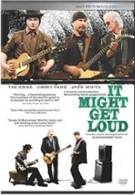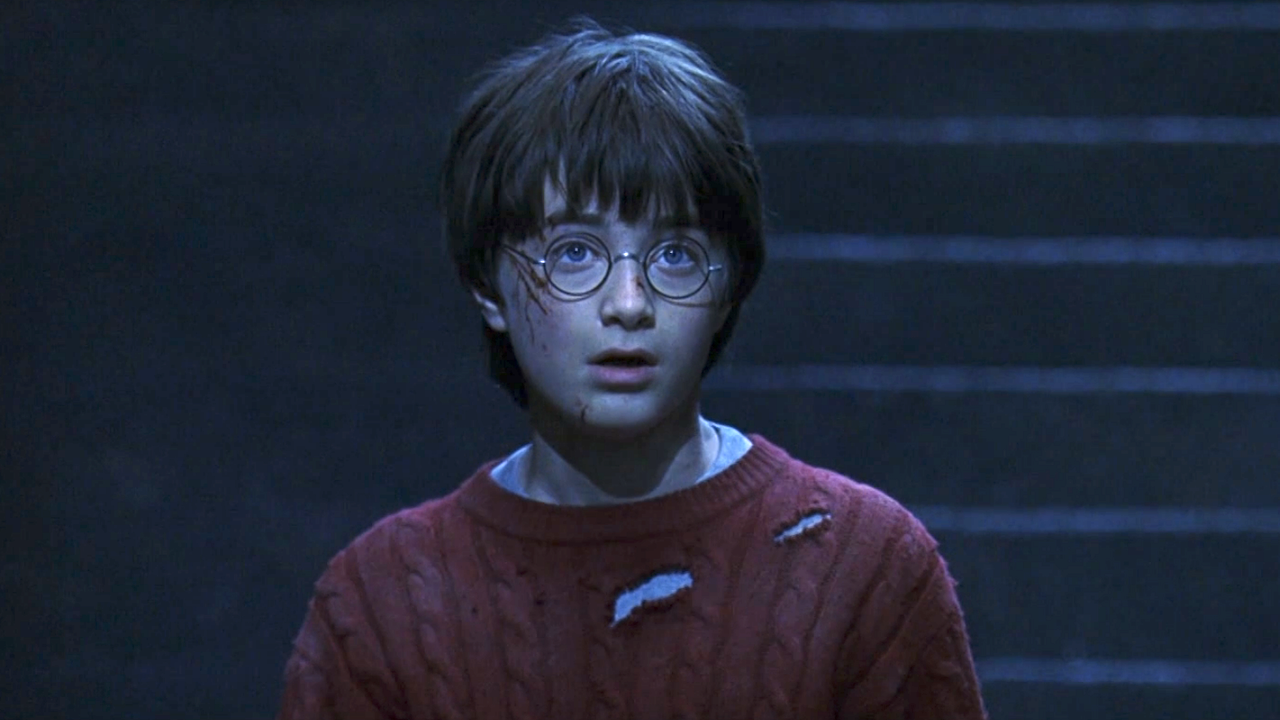Without meaning to incite hate, I must say that while I understand and admire the colossal and über-inspiring careers of Jimmy Page, The Edge, and Jack White, their musical catalogs are far from the forefront of my interests. I have a passive liking for a few of White's 70 or so projects, but The Zep bore me, and I downright hate U2. Of course, none of that stilted my anticipation for a viewing of It Might Get Loud, a multi-faceted documentary centered around why the guitar is so emblematic of rock music. That may seem obvious, as a spotlight on drums would render so many drummer jokes ineffective. The three above-mentioned guitarists offer their deeply personal histories with the instrument, both as an idealistic talisman and a physical, modifiable implement. And it's directed by Davis Guggenheim, the guy behind An Inconvenient Truth. It doesn't ever get as loud as the title teases, but it definitely hits on all frequencies. It Might Get Loud's structure and aesthetic is questionable at times on first viewing. Not negatively, just curiously. This is where the director/producer commentary track comes in handy. Commentaries have totally spoiled my gut reactions to films, for allowing filmmaker intentions into the mix. Nothing is spoiled here, though, because it all makes sense. Here's the breakdown: Guggenheim initially visited Page, The Edge, and White in their respective habitats and captured a few hours of audio interviews with them. These explore each man's passion for the guitar, while also dabbling in the fundamentals of music creation and performance, as well as individual approaches to reaching mass audiences with that same passion. Guggenheim then used the artists' own words to develop the template from which the story could be formed and shot. He explains the effectiveness of this method, and indeed, the best moments in the film stem from things he probably would not have shot had he taken a more formulaic approach. They serve as a moving narration over scenes, intercut with moments from an in-studio meeting between the three.
The very first thing we see is farmland, where Jack White is busy constructing a diddley (one-stringed) bow. He plugs it into an amp and riffs on it. Therein lies the philosophy that White will articulately -- if somewhat derisively -- hammer home anytime he's on-screen: music is less about the equipment you use and more about what you bring to that equipment. The Edge, by comparison/contrast, holds equipment in a higher regard, eager to test the limits of any amount of pedals he can string together. This is where his genius is found. And Jimmy Page is fucking Jimmy Page, man. He's been there, done that, man. He played muzak and studio backings in the '50s. He just doesn't want to ever do that again, straying from the eye of commercial marketing. Except when Godzilla and Sean Combs are involved, I guess. To be fair, though three generations of rock are represented, I'm not sure the entire scope of the genre was taken into account, given White's blues and punk influences were covered by Page and the Edge. (The records White plays are the best, though.) And I'm glad I didn't have to hear someone like Nikki Sixx drone on about how he did it for the pussy and blow. So, that's my minor tiff.
I believe there is enough in this documentary to sate someone not particularly interested in rock music, or music in general, but it's so much more rewarding if you are. There is tons of archival footage of Page and The Edge from their younger days. It really does blow the mind to consider exactly how many places Page's career took him before Led Zeppelin had even become a possibility. We get to see him at unrecognizable ages. The Edge is a nostalgic tour guide, highlighting places around Dublin where his music appreciation grew, and places marking the early stages of U2's popularity. White explains the White Stripes' origins, and some performances are shown, but his main focus is on his inspirations and how he put into practice the things he learned. He allows the cameras to capture a day-long stretch, from receiving a custom-made guitar he'd ordered, through his process of creating a song and honing the lyrics and vocals, then on to putting the project down on a two-track recorder. Both he and Page share albums of artists who mean a lot to them. The twinkle in Page's eyes as he mimes along is heartfelt, especially compared to White's zombo-face. The Edge allows cameras to catch him find his "sound" through pedal rendering. He also shares decades-old recordings and demos. There's some real historical quality going on here.
But when you saw that these three virtuosos were going to be in the same room together, you weren't thinking about them listening to records and going back to elementary school, were you? You wanted to know if they were going to kick the shit to 11 and rock that mother out, right? Well, you will be somewhat disappointed to know that isn't the case. Each shows the other how to play a song, and I won't spoil who shows what. Each has their own little showcase where they show something off. And they end it on a song played all together. For the most part, that's the only time the guitars come out. The rest is conversation, though it's an engaging one. The extras have more going for them by way of further performances.
I consider this almost a must-see, unless you really hate everything I just described. It's not annual holiday viewing or anything, but if you play guitar, you're going to have one in your hands by the time the credits are rolling. Rock will never die, my friends, no matter how hard Nickelback, Creed, and the label "indie" try to kill it. And no one will kill you for yelling, "Stairway! Play Stairway!" because they actually do that here. There's not much more you could ask for from this DVD without being greedy. The movie looks and sounds great. The sections with the three musicians are filmed in HD, so they look especially crisp. The aforementioned commentary, with Guggenheim and producers Thomas Tull and Lesley Chilcott, is a good listen. Tull, a guitar player in his own right, is the one to thank for this doc's conception. It's nice and fan-cheesy at moments, and it appreciates the famed guitarists as much as the film that was made. The dozen or so deleted scenes are split evenly, and each contains more performed music from each artist. Jack White's performing really stands out on the entire disc, because he sings his stuff as well. (Though just seeing Page pick up a guitar is a monument unto itself.) Each scene is well worth a watch, amazingly enough. Lastly, there's a press conference from the Toronto Film Festival, which features all the cast, producers, and Guggenheim. It's a well-paced Q&A that has all the predictable questions, and all the predictable reactions. That's a good thing. The concept's origins, accomplishment, and future are discussed, and it's well worth your time. There are trailers and stuff, but that's about it. Anything else would just be tackling minutiae. Though it doesn't delve as deep as a more planned-out documentary would have, this is still a most unique take on what it means to play a guitar, as well as a frank look at three ascending monoliths of popular rock music. Party on.
Your Daily Blend of Entertainment News

Nick is a Cajun Country native and an Assistant Managing Editor with a focus on TV and features. His humble origin story with CinemaBlend began all the way back in the pre-streaming era, circa 2009, as a freelancing DVD reviewer and TV recapper. Nick leapfrogged over to the small screen to cover more and more television news and interviews, eventually taking over the section for the current era and covering topics like Yellowstone, The Walking Dead and horror. Born in Louisiana and currently living in Texas — Who Dat Nation over America’s Team all day, all night — Nick spent several years in the hospitality industry, and also worked as a 911 operator. If you ever happened to hear his music or read his comics/short stories, you have his sympathy.

